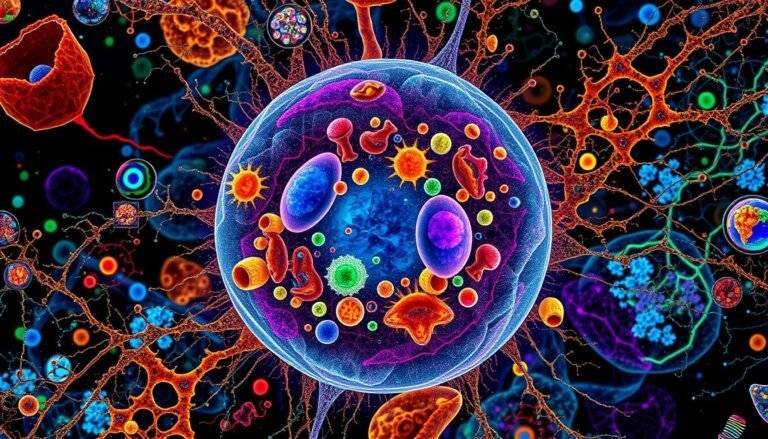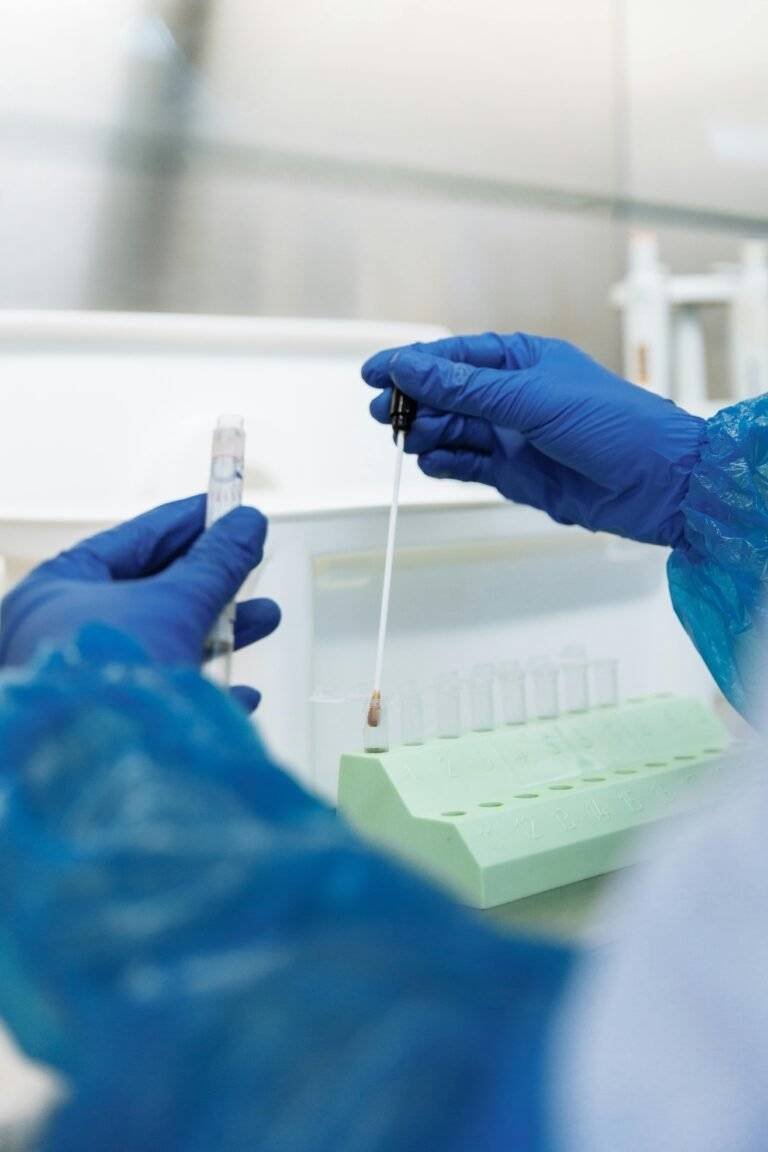Genome Testing: Unlocking the Secrets of Your DNA
Genome testing looks at DNA, the blueprint for life. It shows what traits and diseases you might be at risk for. It also tells you about your ancestry, giving you a deeper look into your health and who you are.
Key Takeaways
- Genome testing offers comprehensive insights into your genetic makeup.
- It helps identify predispositions to various diseases.
- Personalized health plans can be developed based on genetic analysis.
- Understanding DNA secrets aids in making informed health decisions.
- Consulting with specialists, such as those at the Smith Family Clinic, ensures accurate interpretation of test results1.
What is Genome Testing?
Genome testing is a way to deeply analyze a person’s DNA. It finds genetic changes that might lead to health issues. This test looks at all genes or specific parts of the genome to spot DNA changes.
The results help doctors diagnose genetic diseases. They also help create personalized treatment plans.
Understanding the Basics
Genome testing starts with a blood, saliva, or body fluid sample. Doctors use different methods to analyze the DNA. For example, single gene tests are great for diseases like Duchenne muscular dystrophy.
Genetic testing panels check many genes at once. This is useful for conditions like primary immunodeficiency or epilepsy2. Exome sequencing looks at all protein-coding genes, while whole genome sequencing examines the entire genome2.
The Science Behind Genome Testing
Genome testing includes genetic and genomic testing. Genetic testing looks for inherited mutations that might lead to diseases like cancer. It focuses on non-cancerous cells to find germline mutations3.
Genomic testing, on the other hand, looks at cancer cells. It finds unique gene changes that help understand cancer growth and suggest treatments3. Tumor profiling is a part of genomic testing that looks at cancer cell gene changes. It helps make cancer treatments more precise4.
Both genetic and genomic tests are key to understanding health. With 30,000 genes in our genome4, genome testing offers insights for personalized medicine.
| Testing Type | Description |
|---|---|
| Single Gene Testing | Focuses on specific genes associated with particular conditions, like Duchenne muscular dystrophy2. |
| Genetic Testing Panels | Identify genetic mutations in multiple genes simultaneously, useful in conditions such as primary immunodeficiency2 and epilepsy2. |
| Exome Sequencing | Looks at coding regions of genes (whole exome) or specific medical genes (clinical exome), providing a broad genetic assessment2. |
| Whole Genome Sequencing | Examines all genetic material, offering the most comprehensive genetic information available2. |
| Tumor Profiling | Analyzes unique genetic changes within cancer cells to determine optimal treatment strategies4. |
Benefits of Genome Testing
Genome testing has many benefits for your health and understanding of your genes. It helps in preventing diseases, identifying genetic risks, and learning about your ancestry. By looking at your DNA, you gain insights that can change your life.
Personalized Medicine
Genome testing lets doctors tailor treatments to your unique genes. This is called personalized medicine. It makes treatments more effective because they match your genetic makeup. Many people find this approach improves their healthcare experience.
Early Disease Detection
Genome testing is key in catching diseases early. It finds genetic markers for health issues, helping you act before symptoms show. For example, it can spot cancer risk early, allowing for quick action5. Almost every newborn in the U.S. gets genetic screening, showing its importance6.
Ancestry Insights
Genome testing also reveals your ancestry DNA. It lets you explore your ethnic roots and connect with your genetic past. This satisfies curiosity and helps you understand your family history. Direct-to-consumer genetic testing companies have huge databases for ancestry analysis5.
Genome testing can change health outcomes and our understanding of genetic risks. It’s a big step for public health. To learn more, visit the link on genetic testing insights.
Types of Genome Testing
It’s important to know about the different genome tests. Each one helps in different ways, giving us insights into our genes.
Whole Genome Sequencing
Whole genome sequencing looks at all your DNA. It’s great when other tests don’t find the cause. It checks every part of your DNA, finding things other tests might miss7.
Exome Sequencing
Exome sequencing looks at the parts of your DNA that code for proteins. These areas are small but hold most disease-causing mutations7. It’s a good choice when you don’t need to look at the whole genome but still want to find important mutations7.
Targeted Gene Panels
Targeted gene panels check many genes at once for certain conditions7. They’re good when symptoms could be from different genes or conditions7. These panels give focused results, helping you take action.
For more info on genome testing, check out the NHS website.
How to Prepare for Genome Testing
Getting ready for genome testing involves several key steps. These steps help ensure you get accurate and useful results. You’ll need to consult with a genetic counselor, understand the testing process, and know what the results mean.
Consult with a Genetic Counselor
It’s important to talk to a genetic counselor before your DNA test. They will help choose the right test for you. They also explain what the results might mean for your health.
Genetic counselors use your medical and family history to guide you. This helps you make smart choices about your genetic testing.
Understanding the Process
Knowing how genome testing works is crucial. It starts with collecting a sample, like saliva or blood. New technologies can do what used to take years in just a few days8.
For specific tests, methods like PCR are used. This focuses on certain genes or areas of interest8. You should also know how long it takes to get your results. This time can vary based on the test type.
What to Expect from the Results
After your test, understanding the results is key. They can help tailor treatments and lifestyle changes to lower disease risk9. But remember, a negative result doesn’t mean you’re completely safe. Some conditions might not show up in tests9.
In some cases, results might not be clear. You might need more tests or check-ups later9. Always talk to your healthcare team to make sense of your results and plan your next steps.
Interpreting Your Genome Test Results
Getting your genome test results can feel like a lot to take in. But, breaking it down into smaller parts can make it easier. We’ll cover key terms, common findings, and why talking to your healthcare provider is important.
Key Terms Explained
When you look at your DNA report, it’s key to know certain terms. For example, variants of uncertain significance (VUS or VOUS) are unclear and don’t show a clear link to disease yet10. On the other hand, pathogenic variants are known to cause disease. Your report might classify these based on how likely they are to cause a problem, from not likely to very likely11.
Common Findings
Your test results might show different kinds of information. False positives can make you think you’re at risk for a condition when you’re not. False negatives can make you think you’re not at risk when you are10. Also, you might see results that need more study, showing variants that aren’t fully understood10.
Next Generation Sequencing (NGS) is often used to look at your genes closely. This can reveal important information about your health, including things related to your symptoms and other health issues11.
Discussing Results with Healthcare Providers
Talking to your healthcare provider is crucial to understand your genetic health. They can help clear up any unclear results and address any worries about false positives or negatives. It’s also important to ask about re-testing to confirm results, as not all tests catch every issue10.
Since different labs do genetic tests differently, your doctor’s input is very valuable. They can help make sense of your DNA report in a way that’s specific to you11.
The Ethical Considerations of Genome Testing
Genome testing raises many ethical questions. These include privacy, family impacts, and the need for clear consent. As technology advances, these concerns grow more important.
Privacy Concerns
Genetic data privacy is a big worry. In 1992, 38 percent of people said genetic testing should stop until privacy is fixed12. Laws protect privacy, ensuring only those allowed see our genetic info12.
Implications for Family Members
Genetic tests affect not just the person tested but also their family. They can lead to stigma, family fights, and emotional pain13. Tests can show disease risks or carrier status, leading to tough choices13. It’s vital to talk openly with family about what tests might reveal.
Informed Consent
Getting clear consent is key in genome testing. People must know what the test does, its benefits, and its limits. Over 30 years, studies have worked to ensure people make informed choices14.
“The Human Genome Project was a 13-year multibillion-dollar program initiated in 1990, which aimed to identify all the estimated 20,000–25,000 genes. The success of this project has led to rapid advances in genetic testing and highlighted the ethical considerations necessary for its integration into healthcare13.”
Genetic testing is growing in medicine, including for women’s health. Doctors must focus on both privacy and ethics to ensure fair care1312.
| Criteria | Details |
|---|---|
| Privacy | Ensuring genetic information is shared only with authorized parties based on legal protections12. |
| Family Implications | Addressing the potential for genetic results to impact not just individuals but also their relatives13. |
| Informed Consent | Providing comprehensive understanding and agreement on the testing process and implications14. |
Genome Testing and Health Management
Genome testing is changing how we manage health. It lets doctors tailor treatments based on your genes. This leads to better health outcomes for everyone.
Integrating Results into Healthcare Plans
Genetic results help doctors give you advice that fits your genes. This makes it easier to prevent and manage health issues. For example, newborn screening in the U.S. tests millions of babies for genetic disorders. This helps start treatment early15.
Genetic results also help in early testing for future health problems. This ensures you get the care you need before symptoms show up15.
Ongoing Monitoring and Follow-Ups
After genome testing, regular check-ups are key. Doctors can update your care plan with new genetic info or health changes. This helps catch health problems early, like some cancers16.
Genetic test results usually come back in 2 to 3 weeks. This lets doctors make quick changes to your care plan16.
Genetic testing also helps with carrier and prenatal testing. It’s especially useful for those with a family history of genetic disorders. This way, we can prevent certain genetic risks in certain groups15.
For more on genomics labs and health monitoring, check out this resource on genomics labs.
Genetic testing and ongoing health checks lead to better care. Patients and doctors can work together to manage health risks. This approach improves overall well-being.
Cost of Genome Testing
The cost of genome testing varies a lot. It depends on several factors. Knowing these factors and the price differences is key for those thinking about getting tested.
Factors Affecting Pricing
Many things affect the cost of genome testing. These include the type of test, new technologies, and the company’s size. For example, Next-Generation Sequencing (NGS) has made whole genome sequencing cheaper. It went from about $1 million in 2007 to around $600 today17.
Illumina, with 80% of the market, wants to lower costs to $200 per genome with its NovaSeq X series17. Also, companies like 3billion provide Whole Exome Sequencing (WES) and Whole Genome Sequencing (WGS) tests for researchers17.
Insurance Coverage Options
Genetic testing insurance can help lower costs. Some tests, like 23andMe’s Health + Ancestry service, cost between $150 to $300 or more18. Insurance might cover part of these costs, especially for tests needed for health reasons.
For example, Chromosomal Microarray Analysis (CMA) testing without insurance can cost between $1,000 to $2,500. This shows how insurance can save money18.
Comparing Service Providers
Looking for affordable DNA tests? Compare different providers. Companies like 23andMe, AncestryDNA, and MyHeritage offer tests from $59 to $19918. Single-gene tests for specific disorders cost between $100 to $2,000. Whole Exome Sequencing (WES) costs $600 to over $1,00018.
Here’s a comparison of some genetic testing services:
| Service Provider | Test Type | Cost Range |
|---|---|---|
| 23andMe | Health + Ancestry | $150 – $300 |
| AncestryDNA | Ancestry | $59 – $99 |
| MyHeritage | Ancestry | $59 – $199 |
| 3billion | WES, WGS | $600 – $1,000+ |
Understanding the cost of genome testing, looking into insurance, and comparing providers can lead to better, more affordable choices.
Popular Genome Testing Services
Genome testing is getting more popular, with many companies leading the way. They offer services like health insights and ancestry breakdowns. 23andMe, AncestryDNA, and Invitae stand out for their wide range of tests and advanced technology.
23andMe
23andMe provides a wide range of genomic analyses. They offer over 80 genotyping reports and 150+ exome sequencing reports. They also provide more than 10 health predisposition reports to help understand genetic makeup and health risks19.
With over 10 million profiles in its database, 23andMe connects users with up to 5,000 DNA relatives. They focus on privacy and let users control their data. They also allow customers to contribute to ongoing research, helping in scientific discoveries19.
AncestryDNA
AncestryDNA has the largest database among DNA test services, with over 18 million profiles20. This huge database helps users trace their lineage through billions of historical records. They use special sequencing technologies for precise “ethnicity estimates,” adding depth to ancestry insights20.
They offer different membership tiers that give access to more databases and historical documents. This enriches users’ genealogical journeys20.
Invitae
Invitae focuses on genetic testing for medical purposes. It plays a key role in advancing public health and genetic research. It is part of the Genetic Testing Registry (GTR), which lists 67,856 different tests for 26,122 conditions and represents 18,706 genes21.
Invitae’s services help integrate genomic information into healthcare plans. They offer detailed reports on pharmacogenetic responses and somatic/cancer targets. This benefits both patients and healthcare providers21.
The registry’s advanced search capabilities help find specific genetic tests. This enhances genetic health management21.
| Company | Database Profiles | Genetic Tests Available | Unique Features |
|---|---|---|---|
| 23andMe | 10+ million | 80+ Genotyping, 150+ Exome Sequencing, 10+ Health Predisposition | DNA Relative Finder, Privacy Controls, Research Participation |
| AncestryDNA | 18+ million | Ethnicity Estimates | Historical Matches, Extensive Record Access |
| Invitae | Part of GTR | 67,856 Tests Listed | Healthcare Integration, Advanced Search Capabilities |
Future Trends in Genome Testing
The future of genome testing is very promising. This is thanks to big steps forward in genetic testing technology and AI in genetics. These changes are making tests faster, more accurate, and available to more people.
Advancements in Technology
One big change is how much it costs to sequence a genome. It used to cost $1 million in 2007, but now it’s about $60022. As more people want to know their genetic health, handling big data is key. Modern tech can spot complex problems in DNA, showing the need for good data systems22.
Studies on cancer genomes show they often have 4 to 5 key mutations. These can help create targeted treatments22.
The Role of AI in Genetics
AI is changing how we deal with genetic data. It helps experts quickly and accurately analyze DNA. But, it also raises questions about privacy and data safety23.
AI tools can predict how well treatments will work and find genetic reasons for drug side effects. Yet, using these insights for personalized treatments is still rare24.
Expanding Accessibility
More people can get genome tests thanks to global efforts. By November 2022, there were 197,779 genetic tests worldwide, with the U.S. offering 129,62423. The number of new tests has also skyrocketed, from 1,081 in 2012 to 6,214 in 202223.
There’s a push to make genome testing part of health care. Some think it should be managed by health systems, not just the market24. Hybrid models that use eHealth and telemedicine could improve how genetic info is used in medicine24.
As tech and AI in genetics keep improving, the future of genome testing looks even better. To learn more about genomic testing, check out this resource.
Closing Thoughts on Genome Testing
Genome testing is a game-changer that gives us deep insights into our genes. It lets us make health choices that fit our genetic makeup. This way, we can understand our risks and plan treatments that work best for us.
Empowering Individuals with Knowledge
Genome testing uncovers the secrets in our DNA. It helps us make better lifestyle and health choices. For example, finding gene mutations early can help prevent diseases like cancer, improving our lives.
It also lets us see health risks coming. This way, we can start preventing and managing diseases early. This helps us stay healthier overall.
Encouraging Informed Health Decisions
Genome testing does more than just raise awareness. It helps us make smart health choices. It shows us which conditions we might be at risk for, so we can take action.
Even though there are challenges, like worrying about false positives, the benefits are worth it. It’s changing how we think about health and medicine. More people are interested in using genetic testing to improve their health.
In short, using genome testing in health care is a big step forward. It lets us use our genetic information to make better health choices. This way, we can all live healthier lives thanks to science and innovation.
FAQ
What is genome testing?
Genome testing looks at DNA to find out about diseases, traits, and ancestry. It helps doctors make better treatment plans. It can spot genetic disorders and cancer risks early.
How does genome testing work?
It analyzes DNA from blood or saliva. This can show health conditions. It takes a few weeks to get the results.
What types of genome testing are available?
There are many types, like whole genome sequencing and targeted gene panels. Each looks at different parts of DNA for different needs.
What are the benefits of genome testing?
It leads to personalized medicine and early disease detection. It also gives insights into ancestry. This makes treatments more effective and timely.
How should I prepare for genome testing?
Talk to a genetic counselor to choose the right test. Know the sample process and when to expect results.
How are genome test results interpreted?
Understanding key terms and common findings is important. Discussing results with doctors is key for making good decisions.
What ethical considerations should I be aware of in genome testing?
Consider privacy, family implications, and informed consent. It’s vital to know what the tests mean.
How can I integrate genome test results into my healthcare plan?
Use the results for personalized treatment and prevention. Keep monitoring and updating plans as needed.
How much does genome testing cost?
Prices vary by test type. Insurance may cover some costs. Look for affordable options.
Which are some popular genome testing services?
23andMe, AncestryDNA, and Invitae are well-known. They offer various tests, from ancestry to health risks, using advanced tech.
What are the future trends in genome testing?
Expect better tech and AI for faster, more accurate results. Tests will also become more affordable and accessible.
How does genome testing empower individuals?
It gives people important genetic information. This helps them manage their health proactively and make informed choices.





